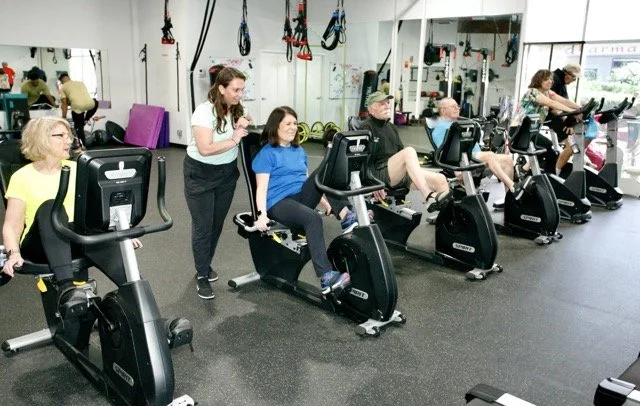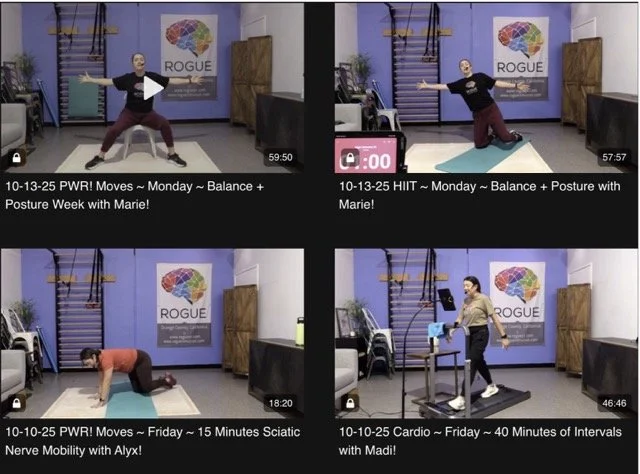Sleep Better, Live Better: Improving Rest for Parkinson’s Management
Living with Parkinson’s disease means navigating a lot of change - how you move, how you feel, and often, how you sleep. While exercise and medication are top of mind for most people, sleep tends to get pushed to the background. Yet, it’s one of the most powerful tools for improving daily life with Parkinson’s.
If you’ve found yourself lying awake at night, waking up multiple times, or just feeling drained no matter how long you’ve been in bed, you’re not alone. Sleep problems affect many people with Parkinson’s. But here’s the hopeful part: there are real, practical steps that can help you rest better and feel more restored.
In this blog, we’ll talk about why Parkinson’s affects sleep, what signs to look for, and most importantly, what you can do to support your body and mind for deeper rest. Along the way, you’ll learn how our Rogue in Motion program helps people living with Parkinson’s find balance, better energy, and stronger sleep routines - both at home and in class.
When Parkinson’s Keeps You Up at Night
It’s easy to think of Parkinson’s as mostly a movement disorder - tremors, stiffness, and slowness are the most visible symptoms. But what happens during the night is just as important.
Many people with Parkinson’s experience fragmented sleep. You might wake up often, toss and turn because of stiffness, or even find yourself wide awake at 2 a.m. Some people struggle to fall asleep in the first place, while others drift off easily but wake long before sunrise.
Why does this happen? Parkinson’s affects the part of the brain that regulates your sleep-wake cycle. It can also alter how your body handles dopamine - a key chemical that helps with movement but also influences alertness and mood. On top of that, symptoms like rigidity, tremors, or frequent urination make it harder to stay comfortable through the night.
Medication timing can also play a role. If your medication wears off in the middle of the night, symptoms may return just when your body is trying to rest. Add anxiety or vivid dreams into the mix, and it’s no wonder sleep can start to feel like a constant challenge.
And the effects don’t stop when the sun comes up. Poor sleep can make daytime fatigue worse, lower mood, and reduce focus. It can even make symptoms like tremors and stiffness more noticeable. When your body is tired, everything feels heavier.
But it’s not all bad news - understanding what’s happening is the first step toward better nights. Let’s look at how sleep issues show up and what signs to watch for.
How Parkinson’s Sleep Problems Show Up
Sleep challenges with Parkinson’s don’t always look the same for everyone. Here are some common signs to look for:
Trouble falling asleep: You might lie awake even though you’re tired.
Waking often during the night: Sometimes from stiffness, discomfort, or the need to use the bathroom.
Acting out dreams: This is known as REM sleep behavior disorder (RBD) and can cause movements or talking during dreams.
Restless legs: An urge to move your legs when you’re trying to relax, often paired with tingling or tension.
Snoring or gasping: These can be signs of sleep apnea, which is common and treatable.
Feeling groggy or unfocused during the day: Even after what seemed like a full night’s rest.
Early morning awakening: Waking up long before you want to and not being able to fall back asleep.
It’s easy to brush off these symptoms as “just part of Parkinson’s”, but they’re not something you have to live with. In many cases, simple adjustments can make a real difference.
Try keeping a sleep journal for a week or two. Note your bedtime, when you wake up, any naps, and how rested you feel in the morning. This gives your doctor or therapist helpful clues about what might be disrupting your sleep.
Recognizing these patterns helps you take the next step - building habits and routines that support better rest.
The next step is finding ways to improve them - both through general habits and specialized support.
Small, Steady Steps Toward Better Sleep
1. Stay Active During the Day
Exercise is one of the best tools for better sleep and for managing Parkinson’s overall. Regular movement helps regulate your body’s internal clock and reduce stiffness that can keep you awake at night.
Try to schedule your workouts earlier in the day, since exercising too close to bedtime can be too energizing. Activities like walking, cycling, dancing, or participating in a Parkinson’s-specific exercise class (like our Rogue in Motion sessions) can help your body unwind more naturally when evening comes.
Even short bursts of movement - a walk after lunch or gentle stretching before dinner - can make a difference.
2. Create a Calm Bedtime Routine
Routines train your body to recognize when it’s time to slow down. Aim to go to bed and wake up at the same times each day, even on weekends.
About an hour before bed, start winding down. Turn off bright screens, dim the lights, and do something relaxing - listen to calm music, read a light book, or do simple breathing exercises.
If you enjoy warmth, a quick shower or bath can relax tight muscles. You can also try gentle stretches or mindfulness breathing to quiet the mind. The key is consistency - when you do similar things each night, your brain starts linking them with rest.
3. Optimize Your Sleep Environment
A few simple changes to your bedroom can make a big difference:
Keep the room cool, quiet, and dark.
Use satin or silk sheets to make turning in bed easier.
Add a supportive pillow or wedge to reduce pressure on joints.
Use soft, warm lighting in the evening to signal wind-down time.
Try motion-sensor nightlights if you need to move safely at night.
Think of your bedroom as a “sleep sanctuary” - somewhere your body associates with rest, not stress or activity.
4. Pay Attention to Food, Drinks, and Timing
What and when you eat can affect your sleep. Try to avoid caffeine after noon, as it can linger in your system for hours. If you enjoy tea, switch to herbal blends like chamomile or peppermint at night.
Alcohol may make you drowsy at first, but it often disrupts deep sleep later in the night.
If nighttime bathroom trips are frequent, reduce how much you drink a few hours before bed. And if indigestion or bloating keeps you awake, opt for lighter dinners and avoid eating too close to bedtime.
5. Use Light to Your Advantage
Your body’s internal clock depends on light exposure. Get bright light or sunlight early in the morning - it helps you feel more awake and resets your natural rhythm. In the evening, keep lights soft and warm. If you’re up late, use a small lamp instead of overhead lights.
6. Rest Smart During the Day
A short nap can help if you’re tired, but long or late naps can throw off your nighttime schedule. Aim for no more than 30 minutes, and nap before 3 p.m. if possible. If you feel sleepy in the afternoon, try gentle stretching or stepping outside for a few minutes of fresh air instead.
7. Manage Stress and Calm the Mind
Parkinson’s can make your mind race - especially when symptoms or worries are on your mind. Mindfulness and relaxation techniques can help your body and brain settle down.
Try this simple breathing exercise:
Inhale through your nose for four counts
Hold for two
Exhale slowly through your mouth for six
Repeat for a minute or two before bed.
You can also listen to a guided relaxation track or soft nature sounds. Over time, your body learns that these cues mean it’s safe to relax.
8. Partner with Your Doctor or Therapist
Sometimes, the best step is to talk to your care team. They can adjust medication timing, screen for sleep apnea, or recommend treatments for specific issues like restless legs or vivid dreams.
If you’re already following healthy sleep habits but still feel tired, ask your doctor for a referral to a sleep specialist familiar with Parkinson’s. Getting professional insight can uncover hidden issues and help you personalize your plan.
Our Program: Rest, Movement, and Mindful Support
We understand that improving sleep with Parkinson’s is about more than bedtime - it’s about balance throughout your entire day. That’s why we offer two specialized programs designed to help people living with Parkinson’s build healthier, more active lifestyles that naturally support better rest.
1. Our In-Person Gym in Orange County, California
Our Rogue Physical Therapy and Wellness in Orange County is a welcoming, fully equipped space built specifically for the Parkinson’s community. With over 6,000 square feet of training space, we offer about 40 classes each week across six types of programs at five different levels - so whether you’re newly diagnosed or years into your journey, there’s a class that meets you where you are.
In-person members benefit from the energy and accountability that come with community. You’ll train with Parkinson’s-specialized physical therapists who understand the unique challenges of movement, balance, and fatigue. Classes include a mix of aerobic workouts, skill-based exercises, strength training, speech therapy, and mobility sessions - all designed to improve stamina, coordination, and confidence.
Beyond the workouts, our in-person program emphasizes whole-person wellness. Members learn how movement, nutrition, sleep, and mindfulness work together to enhance daily life with Parkinson’s. It’s a space filled with encouragement, connection, and consistent progress.
2. Our Online Program: Rogue in Motion
For those who can’t make it to the gym or prefer to train from home, our Rogue in Motion online program combines physical therapy, exercise, speech therapy, and education to help members feel stronger, sleep better, and live with more confidence.
Through our online membership, people with Parkinson’s across the country can join live classes five days a week. Each session is guided by Parkinson’s-specialized physical therapists who understand how movement, medication timing, and relaxation all work together to support better rest and overall wellness.
Here’s how our program supports sleep and overall wellness:
Structured Exercise: Aerobic and skill-based classes help regulate your body clock, reduce stiffness, and boost daytime energy - making nighttime rest easier.
Mind-Body Balance: Guided meditation and relaxation segments woven into classes calm the nervous system and help reduce nighttime restlessness.
Consistent Routine: Regular class times encourage healthy structure, helping you stay active during the day and restful at night.
Holistic Coaching: We teach members how to combine exercise, nutrition, and mindfulness to support deep, restorative sleep and overall brain health.
Supportive Community: Connection reduces stress, and stress relief supports better sleep. Many members share that they sleep better simply from feeling encouraged and engaged.
For those who can’t attend in person, our online community brings expert support directly to you. From guided movement and speech therapy sessions to educational webinars on topics like sleep and Parkinson’s, we help you build small, consistent habits that lead to meaningful change.
As an online member, you’ll get:
Unlimited access to a growing collection of more than 3,000 Parkinson’s-focused exercise videos - ready for you to use anytime, from anywhere.
Live Zoom workouts are offered five days a week, so you can train alongside others and stay motivated with the Rogue in Motion community.
Interactive Q&A sessions led by a physical therapist who specializes in Parkinson’s, giving you expert tips on exercise, nutrition, and overall wellness.
Our approach brings together movement, mindfulness, and education - helping you create daily habits that naturally support better sleep. Whether you join in person or online, the goal is the same: steady progress, genuine connection, and a routine that feels good for your body and mind.
Final Thoughts: A Better Night Starts Tonight
If you’ve been struggling with sleep, take heart - you’re not alone, and you’re not stuck. Better rest often starts with small, gentle changes: setting a steady bedtime, doing a few minutes of stretching, or taking time to breathe before sleep.
When you move your body regularly, manage stress, and create space for calm, your sleep begins to shift - slowly but surely. You’ll notice mornings feeling lighter, energy lasting longer, and your body responding with more ease.
You deserve that kind of rest.
To see these tips in action, catch our replay of our YouTube session, “Sleep Better, Live Better: Improving Rest for Parkinson’s Management.”
In it, we share simple bedtime routines, mindful relaxation practices, and practical advice from our team of specialists.
Start small tonight - turn off the screens, take a few deep breaths, and give yourself permission to rest. With time and support, better sleep can become your new normal.










